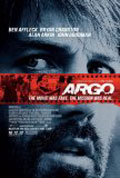
Directed by
Ben Affleck
120 minutes
Rated MA
Reviewed by
Bernard Hemingway

Argo
Synopsis: On November 4, 1979, the U.S. Embassy in Iran was invaded by an angry anti-American mob. Six staff members escaped and made it to the home of Canadian ambassador. The State Department, helped by the CIA, decided to mount a rescue mission and CIA agent Tony Mendez (Ben Affleck), is called in to help. His plan? Smuggle them out as crew for a sci-fi movie called "Argo".
Argo, which announces itself in the opening credits as "based on a true story" is history given a Hollywood makeover. Although it starts as passable history, it ends as pure Hollywood. In so doing it delivers solid entertainment but leaves one saddened that Affleck, and his co-producers George Clooney and Grant Heslov (who also co-produced Clooney’s admirably sceptical Good Night, and Good Luck, 2005, and The Ides Of March, 2011), so easily trade one for the other,
The screenplay is adapted from an article, "Escape from Tehran: How the CIA Used a Fake Sci-Fi Flick to Rescue Americans from Tehran". How historically accurate this article is I have no idea, and we really have no way of judging the veracity of the screen adaptation to real events except on the basis of the film’s internal evidence.
To its credit, Argo starts with a potted history of Iran post-WWII when the Americans installed a puppet ruler, who was ousted by Ayatollah Khomeini's Islamic revolution in 1979, and whose bloody tenure ensured a hatred of America amongst the country’s fundamentalists. Of CIA involvement in installing and supporting ruthless right-wing regimes throughout the region, as well as Latin America and South-East Asia, during the 1950s and 60s nothing is mentioned. Not that there needed to be but this is just one of the many unacknowledged omissions that help to remove Argo far from its basis in truth.
After the historical scene-setting, the film settles down to telling the story of the 6 people who fled the embassy and how they were finally rescued. This is well done. On the one hand there is an impressive re-creation of Tehran of the time (the film was shot in Turkey) and careful attention to reproducing 70s wardrobe and hair styles (the end credits demonstrate how much effort has been put into getting these things right) along with an portrayal of the American media perspective on the events through the judicious use of archival footage. On the other hand there is good fun had with the putting together of the B grade sci-fi movie (all the best lines were in the film’s trailer). Alan Arkin and the always-watchable John Goodman are in fine form here and the film cooks along nicely as it builds to the actual rescue.
Unfortunately when we arrive at this part of the narrative the pot boils overs as Affleck ramps up the tension, cross-cutting between Mendez and his six charges trying to bluff their way onto a departing plane and the Iranian authorities closing in on them. Plot-wise little here makes sense. It all seems too riddled with inconsistencies to be the work of a scriptwriter, yet too engineered “just like the movies” to be what really happened (apparently the whole airport section is a fabrication). One cannot be sure how much of the film is fact and what is fiction but a 49:51 ratio feels about right. Reading between the frames, the whole operation seems more like a comedy of errors and a lot of luck on the American side than a bravura CIA operation or, as the end-titles, almost laughably, claim, a model of international co-operation.
The impression of Hollywood’s hand becomes even stronger in a (literally) Stars-and-Stripes-waving epilogue which has Mendez visit his estranged wife and their son. We see a still from the fake movie propped up next to the boy’s Star Wars figure, and realize that Argo really should have been sub-titled “Or, How Hollywood Saved The Free World” (remember, former actor President Ronald Reagan’s “Star Wars” program is only a few years away).
Ben Affleck’s Tony Mendez is really a re-incarnation of the John Wayne/ John Ford hero – the lone maverick who stands for what he believes in, win or lose – who heads into hostile lands to rescue his own kind from murderous heathens (The Searchers, 1956) and saves the day without receiving public recognition (The Man Who Shot Liberty Valance, 1963). In Argo, Mendez is the sole major character and, much like the Native Americans in Ford films, there is really no more than a passing appearance from any Iranian. Although we know that Mendez is divorced we do not know why. He remains dispassionately removed from his charges and we know nothing of what other CIA operations he was involved in. As far as Affleck is concerned he is a figure who transcends the messiness of reality.
It is not surprising that the Americans have embraced the film with almost adulatory praise (it received an Oscar nomination although the same generosity was not afforded to Affleck). As John Ford so famously said in Liberty Valance: “When the legend becomes fact, print the legend". In the best Hollywood myth-making tradition, that is exactly what Ben Affleck has done. As crowd-pleasing rah-rah Argo works a treat, as history, forget it.

Want more about this film?


Want something different?




